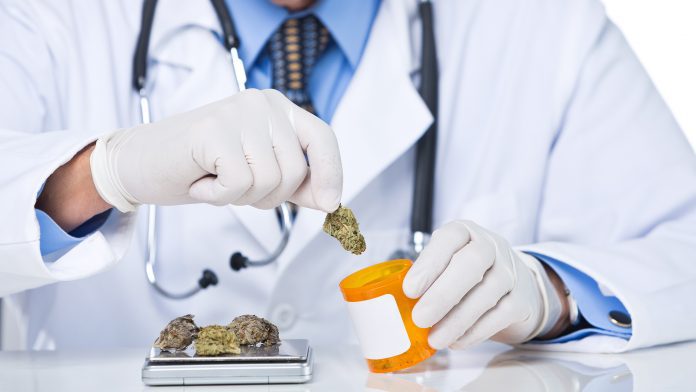
Jonathan Hodgson, the CEO of Rokshaw Laboratories, and Pierre van Weperen, the CEO of Grow Pharma ltd., outline the vast benefits of exporting medical cannabis from the UK.
In 2018 the UK Government made prescribing medical cannabis legal, meaning that certain patients could reap the benefits of these unlicensed medicines for conditions that currently licensed treatments were failing to remedy. However, despite this legislation change, the UK medical cannabis industry has somewhat suffered a bottleneck. UK producers, due to policy, are only permitted to manufacture for the UK market or import finished products from outside of the UK, stunting the economic growth that other European countries have experienced in recent years. To explore the benefits of allowing UK producers to export medical cannabis to other markets, Health Europa spoke to Jonathan Hodgson and Pierre van Weperen, who recently published the paper ‘EXPORT-LED GROWTH FOR THE UK MEDICAL CANNABIS INDUSTRY’ to find out more.
What is the current landscape of producing UK medical cannabis products?
JH: Currently, you can import a finished product which is what we do, and you can import starting materials to turn into a finished product if you can get EU GMP starting materials, which I think only the two of us do at the minute. Only a couple of companies have the right licences to bring in stock materials and turn them into a finished product in the UK.
In the beginning, we were importing a handful of prescriptions, and you are limited on how much you can bring in at a time; you need to prove the clinical need and can only bring in enough for three months of supply at a time. Although the market is growing, there are restrictions that make it expensive, and there are companies struggling to stay in stock, resulting in patients having their prescriptions moved around quite a lot.
It can be quite economical to manufacture in the UK, as opposed to importing a finished product. But the European companies, if they get EU GMP materials, can then export to multiple markets; they are going to be able to scale up and become more and more efficient. Whereas a UK manufacturer, if we can only supply UK patients, we are not going to achieve those economies of scale over time. We produce medical cannabis in small batches or by hand or with quite small vessels, and if those other markets explode, we will get left behind because we can only scale up so much.
What limitations does the current legislation impose?
JH: For all the other unlicensed medicines that we are allowed to handle, you can export them. It requires a lot of MHRA and home office approval, regulations, and red tape, but you can export pretty much any other unlicensed medicine if you have the right licences, but you cannot export cannabis.
I do not think it was intended to be like that. I think the regulations were just intended for the very short term to help parents of epileptic children who were having to bring in products illegally to stop the seizures. However, because of COVID-19, the market has evolved, and the regulations or the interpretation of the regulations has not evolved in the last three years.
PVW: It is important to understand the difference between regulation and policy and regulation and implementation because we can manufacture unlicensed medicines in the UK, and we can export those. There is nothing that stops us from doing that, except if it is cannabis. There is a policy bit on top of it that somehow makes cannabis an exception versus everything else. We do not even need regulations to change; we need the policy to be removed and have cannabis treated just like any other Schedule 2 medicine. Importantly for the manufacturing, and then for the exporting, it is basically as simple as that.
As long as you use EU GMP quality products, you can manufacture any unlicensed medication, or you can import any unlicensed medication, and with cannabis, it is the same thing. In addition, we need clinical need letters from doctors to explain to the Home Office how many patients they will have. So that is an extra control on top of the quantity that we want to import. That again is not a regulation, that is a policy thing from the Home Office for no other scheduled drug than cannabis, and the same goes for exporting. So, remove the policies, and it is done.
Are there open lines of communication between industry experts like yourselves and those with the power to make this policy change, and what are some of the reasons you think they might be hesitant?
PVW: It has been very slow, and part of the reason why it has been very slow is that people in government or MPs do not necessarily understand the difference between medical cannabis and CBD and the fact that there is a policy on top of it that means it is not a two-minute explanation. Another thing that seems to be stalling progress is deviation concerns, where products that come in might end up somehow on the black market if there is no massive control on how much comes in. We are renowned, well-established pharmaceutical companies with an extensive list of licenses; we would be incredibly silly to deviate products that we import and risk losing our licenses.
JH: If the trust is not there, we would not have the licences that we have. We can bring in as much of any other controlled drug from our approved sources and supply to customers that we can approve from our licences. MHRA inspect us regularly; they have the power to come in at any point if there is any suspicion. We take a lot of legal burdens to have these licences. We are trusted to bring in Schedule 2 drugs that are far more harmful, potential substances of abuse, whether that be diamorphine, cocaine, or ketamine. We have these products under lock and key. We have to report every little microgram of it that we use and record it, not just what we sell but also if we drop any during production or a little bit is stuck to the side of the vessel that does not get used; we have to explain everything and keep records of everything. We are one of a small number of companies that are entrusted to do this, so why would cannabis be any different?
What are the potential benefits of enabling the export of UK medical cannabis?
PVW: If we can change the policy that stops us from exporting, we could manufacture for the European market. The European market in Germany alone has 150,000 patients, Poland is opening up, Luxembourg is opening, and so are the Netherlands, Italy, and probably Spain next year. If we could get a 10% share of that market, we would probably have 100 to 150 million pounds of manufacturing products that we could export. We could create 50,000 to 100,000 jobs by doing that, and it is just a policy change.
The policy stops research, investment, and expansion and does not generate any money for the UK economy. We struggle with investors wanting to invest in UK medical cannabis because it is contained to the UK. We cannot say to them that we are going to export to Germany or Spain in the next two years, which will add X amount of revenue.
For example, for one of the companies we work with, Colombia Care, we are manufacturing capsules and cartridges for vape pens for UK use. By changing the policy, we could manufacture those at a large scale for Germany, France, and other markets than the UK, which would create lots of jobs and bring in money. We could also export to Malta and Ireland, two markets that are very keen on getting our products. Right now, it is easier to buy and manufacture a tank or a cannon in the UK and export it than it is to buy, manufacture and export a pack of cannabis capsules.
JH: Germany is the headline market because of its sheer size as a medical market at the moment within Europe, but there are various other markets; there are trials in France at the moment, there is a nascent market for cannabis oils in Italy, whereas that has previously been a flower market. So, currently, UK companies are missing the opportunities to establish themselves.
How does the current policy impact medical cannabis research and industry development?
JH: Policymakers are asking for more research and more clinical trials, but they are slowing those processes down, and it is counterproductive. Regulators and NICE would say they want to see more research, but if you want really good clinical trials, they cost a lot of money, and the UK market does not justify the returns that you are going to make on it. If they want UK companies to invest in really good quality, randomised, double-blinded, proper pharma style clinical trials, then the only way people are going to be able to do that is if they are going to be allowed to export their products at the end of that process.
We get approached by universities for different research projects all the time. Even a company like ours that has a Schedule 1 to 5 make, possess, supply license, we are allowed to bring in a product for research, but we are not allowed to bring in a product at the moment to supply to other companies or for the universities to research, which again, is crazy. We have had approaches from at least three UK universities that are told to find a company like ours, and we can bring it under our licence, but then we cannot supply it to that facility to go and carry out the research, which is ludicrous. A lot of research and progress has been prevented, such as big clinical trials, people doing PhDs, and even those who want to investigate production or extraction methods.
For patients with conditions that could be mitigated through medical cannabis, how could exporting the drug enhance their current situation?
JH: By scaling up through export, medical cannabis could become a more cost-effective medicine in the UK. One of the current threats to the NHS is the potential cost of medical cannabis because we are manufacturing this product in small, handmade batches or importing them in small quantities to the UK, which is far more expensive than making any other painkiller or substitute product that is made in batches of hundreds-of-thousands. The only way that the cost-effectiveness will be long-term is if we are allowed to scale up, which Europe will allow. Short term, patients are paying for this themselves as a private medicine 99.9% of the time. So, any wins by scaling up by having UK products is better for UK patients because the price is significant.

PVW: Children with epilepsy take significantly higher doses of medication than basically everybody else, which increases cost. The other part of why this increases cost is because they are all very keen on getting a certain product that is only manufactured in the Netherlands. So that increases travel expenses and everything else, and we can manufacture that product in the UK at 10-20% of the price. These children with epilepsy experience 300 to 400 seizures a day, so when they finally get their seizures controlled on a certain drug, I understand why they would be resistant to move on to something else, even if it can be cheaper. The point is that there is a public perception that medical cannabis is very expensive, but that is not the case.
If you take medical cannabis on prescription in a regular amount, you are not going to be spending more than three, four, five or at the most ten pounds a day on your medication, and that is the reality. Our most expensive flower is £350 per month, and if you do oils, it will probably be half or even less than that. If you have anxiety or general pain, you are probably looking at £5 per day maximum.
Jonathan Hodgson
Rokshaw Laboratories
Jonathan@rokshaw.co.uk
https://rokshaw.co.uk/
Pierre van Weperen
Grow Pharma
Pierre.vanweperen@growbiotech.com
https://growgroupplc.com/
This article is from issue 21 of Health Europa Quarterly. Click here to get your free subscription today.









